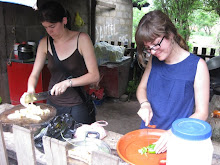This me-centered approach leads to lists like one developed by the Environmental Working Group, (mentioned in my strawberry post), called the "dirty dozen" and the "clean 15." The fifteen fruits and veggies less likely to have traces of pesticides are considered safer for consumers to eat when not organic. However, does that mean the workers aren't affected by these same chemicals? I doubt the lists would make a difference for them.
I'm grateful for the EWG resource, and I think it's likely their strategy is meeting consumers where they are instead of pushing an activist agenda. It's also important to give options to families who cannot afford an organic-only shopping cart, so they can protect themselves from the highest chance of pesticide exposure. However, it's tragic we don't hear more about how agricultural worker's lives are ruined by pesticide exposure.
What do I mean by "ruined"- have I exaggerated my language with my frustration? Absolutely not. Right now my partner and some other good friends are working in a community where the chemical sprayed on the sugar cane is causing kidney disease. Many of the men in the area are either dead or dying from an entirely preventable situation.
The cane is processed into Nicaraguan rum, called Flor de Caña, which the World Bank has supported with loans despite mounting pressure from families of the deceased. Watch the trailer of The Affected for more details on this breech of justice, and check out their thorough reading/film list under "learn more." One of the most striking quotes on the site, in my opinion, is "the Trade and Environmental Database refers to the use of DBCP as a "circle of poison" in which US-banned pesticides are shipped internationally and sprayed on crops which are then shipped back to the US for consumption."
Creating safer jobs, and educating Nicas and Americans about these issues, are some of the ways I think we can combat these types of abuses. No one is safe, consumers and workers alike, until our food is free from all banned chemicals.
 (our friend Darwin at the entrance to his organic coffee cooperative, named "Green Gold," in the Nicaragua cloud forest preserve MiraFlor)
(our friend Darwin at the entrance to his organic coffee cooperative, named "Green Gold," in the Nicaragua cloud forest preserve MiraFlor)


a post by timothy on this issue:
ReplyDeletehttp://dzurilla.blogspot.com/2009/07/sign-of-progress.html